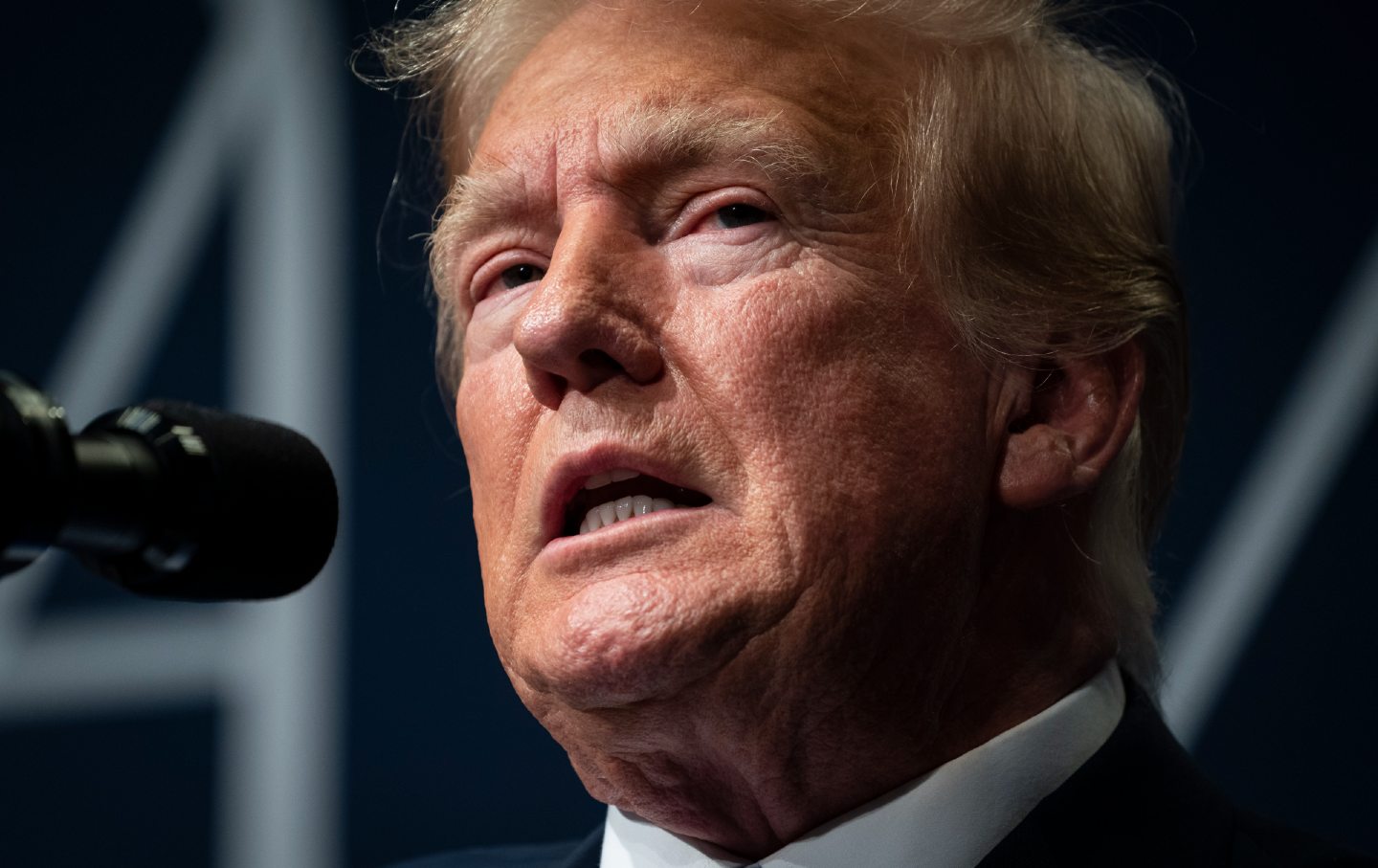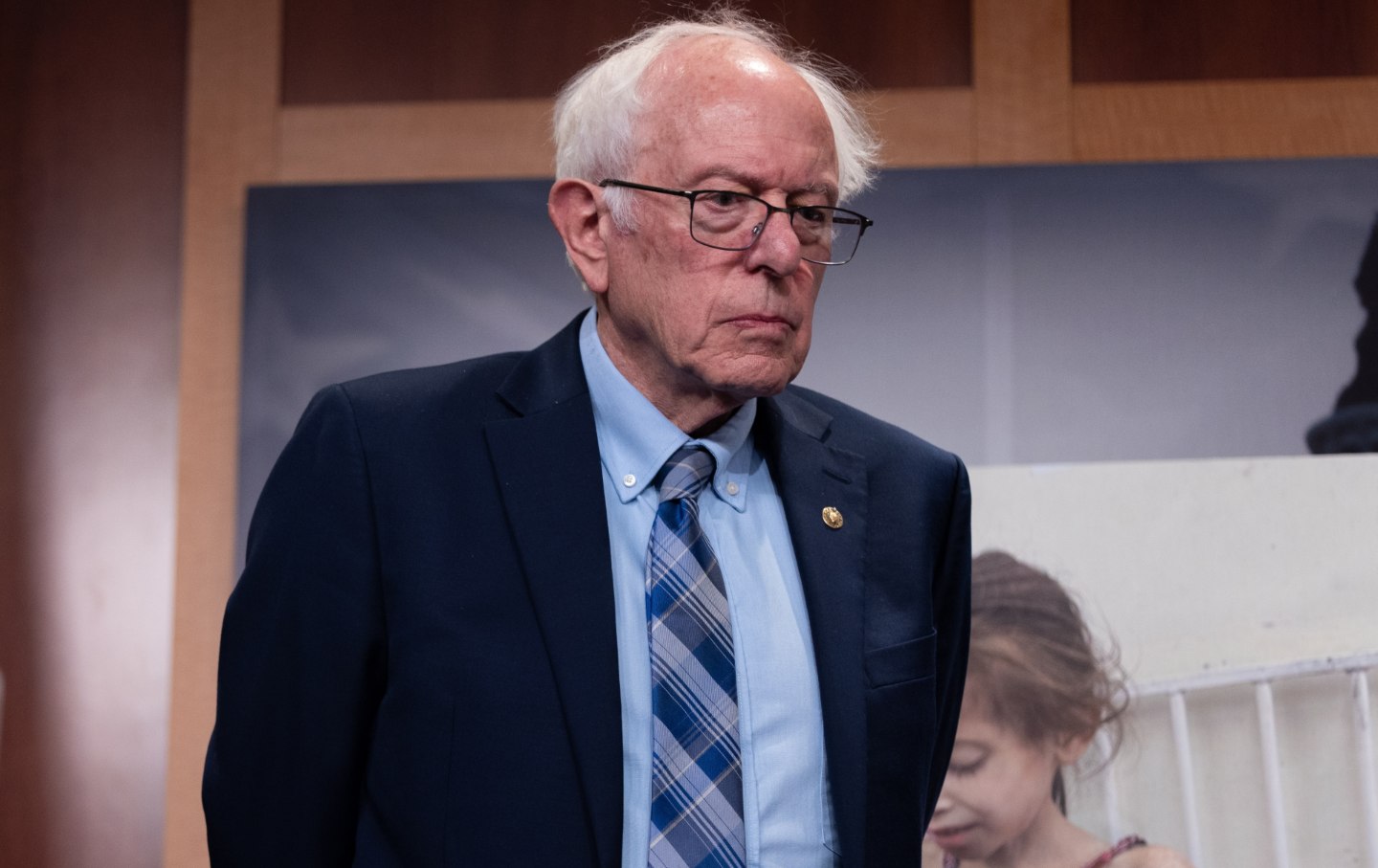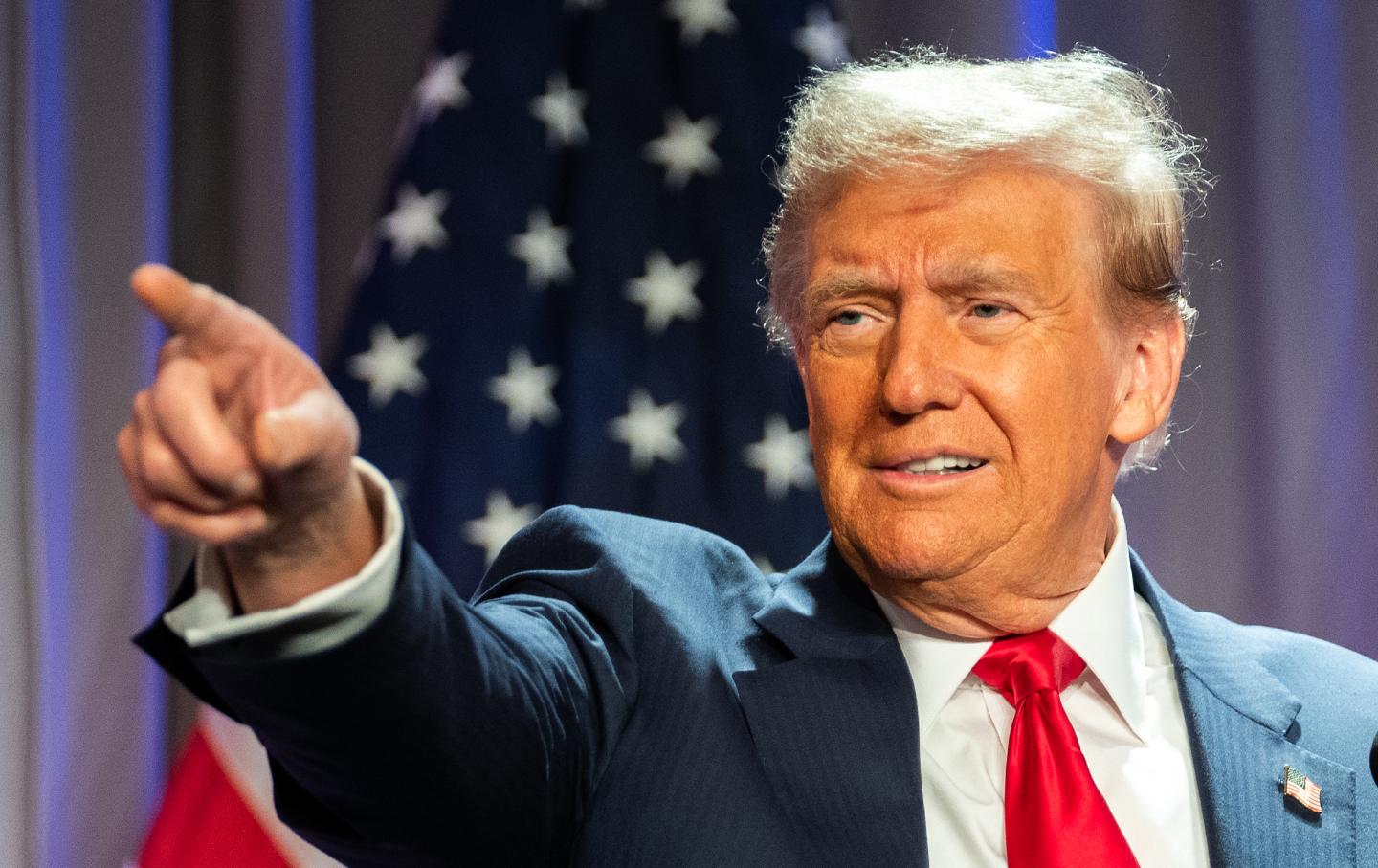Donald Trump Makes American Women an Offer They Can’t Refuse
The former president wants to turn gender relations into a protection racket.

Donald Trump thinks and acts like a gangster—which is why his offers of protection always carry an undertone of threat. As my Nation colleague Sasha Abramsky and others have noted, Trump’s foreign policy is premised on the idea that the United States would act as a global godfather, protecting allies in Europe and Asia in return for their tributes, but also perfectly willing to throw to the wolves those who don’t pay. Trump’s message to NATO has often been a variation of “Nice little European security system you have here! Would be a pity if anything happened to it.”
The same rhetoric of protection governs Trump’s domestic agenda. He casts himself as the strongman who can defend his supporters from various bogeymen, not just liberals and Democrats but also, more fancifully and hysterically, from socialists, Marxists, communists, Black Lives Matter, antifa, marauding immigrants, and even (taking his usual lies to the point of absurdity) cat-and-dog-eating Haitians.
In this presidential cycle, Trump’s protection racket has taken on a sinister misogynist dimension. Trailing in polls with women because he ended the constitutional right to abortion by nominating three reactionary Supreme Court justices—and because of his own infamous sexism—Trump has developed a new line: that he’s a protector of women.
Speaking at a rally in Green Bay, Wisconsin, on Wednesday, Trump went even further than his normal spiel by acknowledging that the protection he was offering wasn’t consensual. Trump started by admitting that his own campaign advisers told him that his description of himself as the protector of women was “very inappropriate.” Trump says he responded, “I want to protect the people. I want to protect the women of our country. I want to protect the women.” Then Trump added, “I said, ‘Well, I’m going to do it, whether the women like it or not, I’m going to protect them.’”
Kamala Harris responded by saying Trump’s rhetoric was “very offensive to women in terms of not understanding their agency, their authority, their rights and their ability to make decisions about their own lives including their own bodies.”
Trump is not just harking back to an older patriarchy but also zeroing in on the anxiety of his young male followers. Faced with what polls predict as a surge of women supporting Harris, the Trump campaign has decided that the gender gap can work in their favor if they can just rile up enough men—particularly young men.
On Wednesday, prominent Trump supporter Charlie Kirk of Turning Point USA spelled out the anxiety at play in a tweet:
Early vote has been disproportionately female. If men stay at home, Kamala is president. It’s that simple. If you want a vision of the future if you don’t vote, imagine Kamala’s voice cackling, forever. Men need to GO VOTE NOW.
Commenting on Kirk’s lament, Jess Bidgood of The New York Times noted:
It was a post that managed to both bemoan and explain a dynamic that has come to define the country’s first presidential election since the Supreme Court overturned the right to abortion. The gender gap between Harris and former President Donald Trump has grown large enough that just the fact of high turnout among women is enough to spook Republicans—and yet they keep talking about women in ways that may further intensify that gap.
So Kirk may well be right that they need to scare up more men.
Bidgood observes, “The gender gap is especially pronounced among young voters. Among men between 18 and 29, Trump leads 58 percent to 37 percent, while Harris leads 67 percent to 28 percent among young women.”
The problem for Trump is that not only is he more opposed by women than he is supported by men but women historically vote at a significantly higher rate than me. Traditionally, women vote by a rate roughly two percent higher than men: In 2020, 53 percent of women voted, and 51.3 percent of men.
But in 2024, early voting indicates the gender divide in voting has intensified, with women far more eager to vote. According to NBC News, of the nearly 62 million votes already cast, at least 54 percent are from women, 44 percent from men, with 12 percent not known. In the swing states, the numbers are sometimes starker. In Pennsylvania, 56 percent of early voters are women, as against 43 percent men. In Georgia, 56 percent are women, 44 percent men.
If women continue to vote at a rate 10 percent higher than men do, Trump’s presidential bid is in big trouble. No wonder Charlie Kirk is worried. Nor is he alone. Right wing influencer Mike Cernovich tweeted, “Male turnout in Pennsylvania for Trump has been a disaster. Unless this changes, Kamala Harris takes PA and it’s over.”
Republicans have been made equally anxious by some pro-Harris ads, one of which features actress Julia Roberts, encouraging married women to make up their own minds and not follow their husbands. Both former House speaker Newt Gingrich and Fox News host Jesse Watters—two men not exactly famous for marital fidelity—complained that the ad undermined the sanctity of wedded life. According to Gingrich, “For them to tell people to lie is just one further example of the depth of their corruption. How do you run a country, saying wives should lie to their husbands, husbands should lie to their wives?” Watters fulminated, “If I found out [my wife] Emma was going into the voting booth and pulling the lever for Harris, that’s the same thing as an affair.”
One problem Republicans are running into is that there’s scant evidence women want the kind of protection Donald Trump is offering. Nor do many women share the desire to subsume their political judgement to husbands like Gingrich and Watters.
A further problem, perhaps seen in the low male turnout to date, is that many men aren’t necessarily invested in Trump’s vision of patriarchy either. To be sure, the majority support that Trump has among men does point to the continuing power of misogyny. But consider the actual policies Trump can be linked to.
There’s good reason to believe that on matters relating to sexual freedom, much of what the Republican Party stands for is alien to many men. According to a Pew poll, 61 percent of men and 64 percent of women support legal abortion. Project 2025, an ambitious agenda that has shaped Republican goals for the next Trump administration, advocates banning pornography—a position that a majority of Americans have long opposed.
As opposed to the Trump campaign’s alienation of women, the pro-Harris PACs have cagily decided that men—particularly young men—can be won back on these issues of sexual liberty.
Popular
“swipe left below to view more authors”Swipe →Progress Action Fund has released an incendiary ad on social media that opens with a young couple making love. The condom breaks and so the young man goes to bathroom to get Plan B, but he’s stopped by a Republican congressman who says that contraceptives are now illegal and he should prepare to become a “daddy.” A similar ad from the group warns of the dangers of pornography being outlawed. A parallel campaign warning of Trump’s subservience to the social conservatism of Project 2025 and its goal of outlawing porn is targeting viewers of adult websites.
The election remains, by all evidence, very close. But one reason to be optimistic about Harris’s chances is that her campaign and its allies have figured out a message of freedom that is energizing women, and even bringing a critical mass of men along.
If Trump loses, it’ll be because women didn’t want his protection racket—and even some men saw it as a path to their own loss of freedom.
We cannot back down
We now confront a second Trump presidency.
There’s not a moment to lose. We must harness our fears, our grief, and yes, our anger, to resist the dangerous policies Donald Trump will unleash on our country. We rededicate ourselves to our role as journalists and writers of principle and conscience.
Today, we also steel ourselves for the fight ahead. It will demand a fearless spirit, an informed mind, wise analysis, and humane resistance. We face the enactment of Project 2025, a far-right supreme court, political authoritarianism, increasing inequality and record homelessness, a looming climate crisis, and conflicts abroad. The Nation will expose and propose, nurture investigative reporting, and stand together as a community to keep hope and possibility alive. The Nation’s work will continue—as it has in good and not-so-good times—to develop alternative ideas and visions, to deepen our mission of truth-telling and deep reporting, and to further solidarity in a nation divided.
Armed with a remarkable 160 years of bold, independent journalism, our mandate today remains the same as when abolitionists first founded The Nation—to uphold the principles of democracy and freedom, serve as a beacon through the darkest days of resistance, and to envision and struggle for a brighter future.
The day is dark, the forces arrayed are tenacious, but as the late Nation editorial board member Toni Morrison wrote “No! This is precisely the time when artists go to work. There is no time for despair, no place for self-pity, no need for silence, no room for fear. We speak, we write, we do language. That is how civilizations heal.”
I urge you to stand with The Nation and donate today.
Onwards,
Katrina vanden Heuvel
Editorial Director and Publisher, The Nation
More from The Nation

Trans People Shouldn’t Be Scapegoated for Democrats’ Failures Trans People Shouldn’t Be Scapegoated for Democrats’ Failures
Politicians and pundits are stoking a backlash to trans rights in the wake of the election. They’re playing a dangerous game.

Bernie Sanders Is Leading a Bold New Effort to Block Arms Sales to Israel Bernie Sanders Is Leading a Bold New Effort to Block Arms Sales to Israel
The senator has more allies than ever in his fight to hold Israel accountable and save lives in Gaza.

Will “Serious” Republicans Block Any of Trump’s Freak-Show Cabinet Picks? Will “Serious” Republicans Block Any of Trump’s Freak-Show Cabinet Picks?
Will they stand up to even the scariest of these nominees? I’m not optimistic.

Harris’s Gaza Policy Was a Disaster on Every Level Harris’s Gaza Policy Was a Disaster on Every Level
Palestine may not have swung the election one way or another. But Democrats unquestionably paid a high price for their refusal to hold Israel accountable.

Donald Trump Has NOT Won a Majority of the Votes Cast for President Donald Trump Has NOT Won a Majority of the Votes Cast for President
Donald Trump’s popular vote total has fallen below 50 percent, and his margin over Kamala Harris has narrowed considerably as all the votes are counted.

When Does Power Concede? Thwarting MAGA Will Take More Than Protest and Symbolic Resistance. When Does Power Concede? Thwarting MAGA Will Take More Than Protest and Symbolic Resistance.
If we want to deploy actual power to block Trump’s vicious agenda once he takes control of the federal government, we will have to look to the states.


